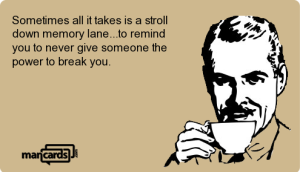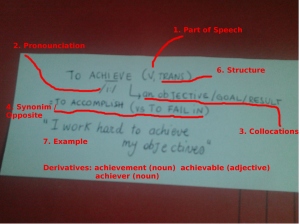You can’t be bothered to read this blog post and would rather listen to someone reading it?
 Then click here to listen to my first podcast!
Then click here to listen to my first podcast!
Since some of you quite liked my last post about prepositions, I thought I would write another one on the same topic. This time we’ll focus on the verb ‘to remind’ and the prepositions that can follow it.
 But first, I would like to point out the difference between two verbs that students often seem to confuse: ‘to remind’ and ‘to remember’.
But first, I would like to point out the difference between two verbs that students often seem to confuse: ‘to remind’ and ‘to remember’.
1) TO REMEMBER SOMETHING OR DOING SOMETHING
To remember something or doing something means to have a memory of it like in the following examples:
I remember meeting you at the party. >> I have a memory of meeting you at the party.
I remember her from my school days, we were in the same year. >> I have a memory of her from my school days.
Notice that when used to talk about your memories, ‘to remember’ is followed by a noun/pronoun (her) or a gerund (meeting).
2) TO REMEMBER SOMETHING OR TO DO SOMETHING
To remember something or to do something is used when talking about something that it’s on your to-do-list or that you shouldn’t forget:
Will you remember to buy potatoes on your way home?
I’m so sorry, I didn’t remember your birthday!
As you can see in the above examples, remember is never followed by ‘someone’ so the structure ‘to remember someone to do something’ would be incorrect in English. Instead, you should use ‘remind’ in this case.
TO REMIND SOMEONE SO THEY WON’T FORGET
1) If you remind someone to do something, you make sure they will remember to do something that they have to do:
Don’t worry, I’ll remind Dad to pick you up from school. >> I’ll make sure he’ll remember he needs to pick you up.
2) If you remind someone ABOUT something, you want to make sure they won’t forget about it:
I’d like to remind you about tomorrow’s meeting, please come ready. >> I’d like to make sure you haven’t forgotten about tomorrow’s meeting
TO REMIND SOMEONE OF SOMETHING/SOMEONE ELSE BECAUSE OF SOME SIMILARITY
1) If someone reminds you OF someone else, it means that you think these people are somehow similar. Have a look at this example:
Lucy reminds me of my cousin Mary. They are both very friendly and chatty.
2) The same can be said if something reminds you OF something else:
This place reminds me of my home town. It’s just dead and boring. >> My home town is also dead and boring
TO REMIND SOMEONE OF SOMETHING/SOMEONE ELSE >> TO BRING BACK MEMORIES FROM THE PAST
If something reminds you OF someone/something it means that this thing (a place, food, a song etc) brings back some memories from the past like in the following sentences:
This food reminds me of my mum. She used to cook a delicious fish pie.
This song reminds me of our holiday in Cuba.
Hope this helps! 🙂
Talk soon,
Deb








